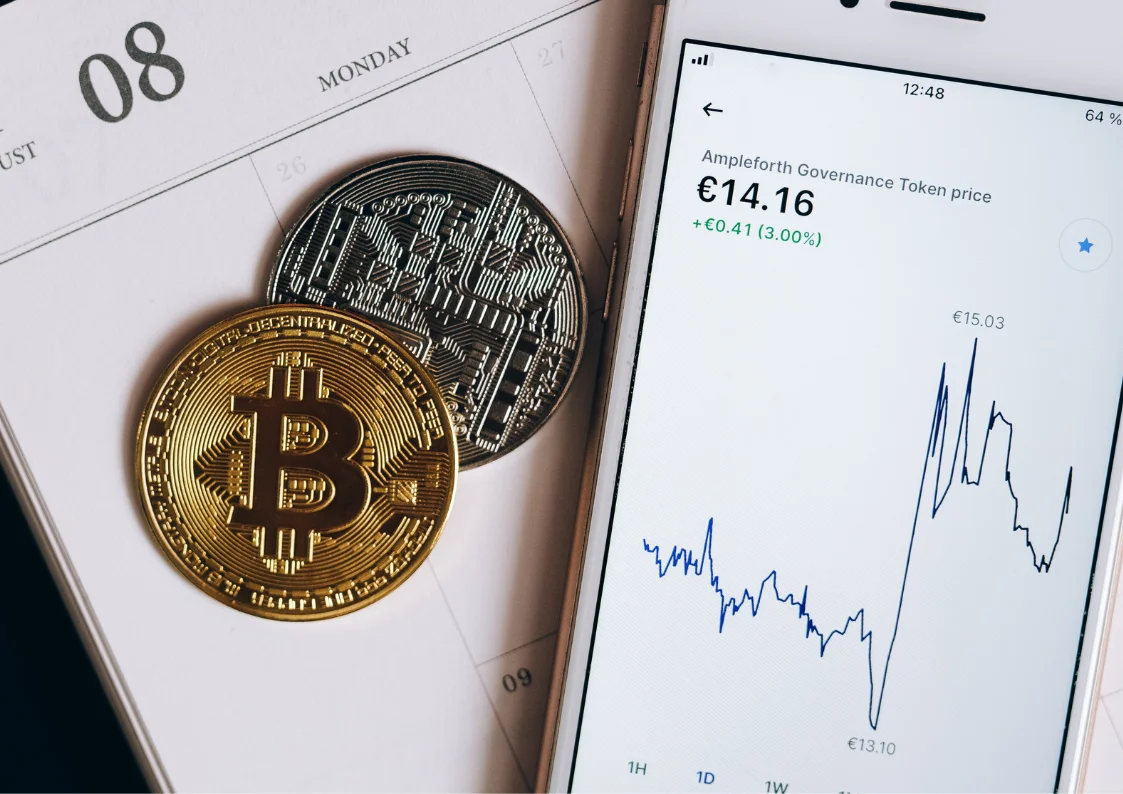
Some people in the finance industry now refer to cryptocurrency as an investable asset class that has exponentially grown over the years. There are over a thousand different cryptocurrencies, which you can find on various exchange platforms, and apparently, new ones are added daily. Some of the most popular cryptocurrencies are Bitcoin, Ethereum, Tether, Ripple, and Solana.
And while it is an investable asset, the question of whether or not to invest in cryptocurrency is never easy to answer. Why is that? Because traditional valuation methods, such as the price-to-earnings ratio or dividends-to-price ratio, do not apply to crypto assets.
Still, if you want to explore the possibility of adding crypto to your investment portfolio, there are several things you need to consider.
Table of Contents
Understanding the Risks of Cryptocurrency
One of the significant risks of investing in crypto is volatility. For instance, the value of Bitcoin can go up or down by 10% anytime, any day. So, say you purchase Bitcoin for $10,000 today, and tomorrow, you wake up to see its value has gone up to $12,000; there is a huge possibility that its value will drop to $9,000 the following day. That means your investment would have dropped by 20%.
And it’s the same for all cryptocurrencies, except Tether, the third-biggest digital coin in the world based on market value. What sets Tether apart from other cryptos? It is known as a stablecoin, a type of digital currency tied to real-world assets like the U.S. dollar. Thus, it maintains a stable value, unlike other cryptos, which are volatile.
The overall unpredictability of crypto makes it a risky asset class, especially for those who have no idea how to manage it properly. However, cryptocurrencies may be considered standalone assets that are not tied or co-related with other asset classes like stocks, gold, or oil. What’s more, geopolitical factors like interest rates or tariffs don’t have a bearing on cryptocurrency, unlike traditional investments.
Simply put, cryptocurrency has its unique risk profile. If you’re keen on investing in it, you must understand that this risk profile can make you more money in cryptocurrency than you might make on conventional investments.

Pros and Cons of Investing in Cryptocurrency
As can be gleaned from the previous section, investing in cryptocurrency is no walk in the park, especially for newbies. Here’s a list of the pros and cons of investing in cryptocurrency you can go over. After considering them, you’ll better understand how each could affect your decision to invest in cryptocurrency. Let’s outline some of the cons first:
- It takes time and effort to understand cryptocurrency.
- Newbies to cryptocurrency are laying themselves bare to security risks.
- Because cryptocurrency is volatile, it is challenging to price it accurately to add to your investment portfolio.
- There are no guarantees where cryptocurrencies are concerned since they haven’t proven themselves as long-term investments.
- The blockchain technology behind cryptocurrency is highly invulnerable to hacking. Still, you can get hacked personally if you give out sensitive information (ex., your private keys). Small-time exchange platforms may also be hacked, and there lies the problem.
Now let’s go over some of the pros:
- Cryptocurrency, particularly Bitcoin, is handsdown one of the most liquid investment assets, thanks to global trading platforms, exchanges, and brokerages. Because of its high liquidity, it makes for a potentially great investment product, especially if you’re after short-term profit. That is not to say that crypto also makes for an ideal long-term investment because of its high market demand.
- Cryptocurrency is a high risk, which means the potential for high returns is aplenty when used with traditional investing. Be that as it may, crypto presents lower inflation risk. Unlike “regular” currency, crypto is nearly impervious to hyperinflation. Please take note that we’re saying “lower” inflation risk, not “no” inflation risk. Cryptocurrency is still susceptible to inflation; the difference is, it happens at a predictable rate—the value of crypto is halved every four years. The blockchain technology supporting crypto is infinite; thus, there is no need to worry about cryptocurrencies losing their value.
- It has a very low correlation to conventional asset classes.
- The blockchain technology on which cryptocurrency is anchored is inherently secure.
- Cryptocurrency trades round-the-clock.
These are just some of the advantages and disadvantages of investing in cryptocurrency.

Factors to Consider
So should you take the plunge? Only you can conclusively answer that question. To determine whether you should add cryptocurrency to your investment portfolio, you will do well to consider the following factors:
Know and understand your risk profile.
When investing in cryptocurrency, knowing what you are getting into is crucial. This entire process is a form of speculation with a considerable risk of loss. You would likely lose everything you invest into crypto, so you need to be prepared for that.
Ask yourself these questions before investing in cryptocurrency: “Do I tend to be an impulsive buyer?” “Do I have difficulty making decisions?” “What are my financial goals?” “What is most important to me?” If you answer “yes” to the first two questions, cryptocurrency investment may not be for you. And if your answer to the last two questions is to save for retirement, you would be better off looking for safer investment options with better return rates.
You need to understand how to get started.
First, register for a cryptocurrency wallet and sign up with a crypto exchange platform like Binance. The crypto wallet is where you will store your cryptocurrencies and access your private key, keeping both secure in the process. Since whatever you invest will be safekept in a digital wallet, it’s essential to choose one that won’t take you through a complicated process each time. Consider the level of control you want over your digital assets before buying or selling them using an exchange platform.
On the other hand, the exchange platform serves as a marketplace where you can buy cryptocurrencies with fiat currency. So do your research when deciding on an exchange platform. Remember that exchanges vary in terms of features and levels of security. So naturally, you would want one that ranks high in both. Here are some considerations when researching an exchange platform:
- Security level—How safe will your account be?
- Reputation—Is the exchange platform trustworthy and with a proven track record?
- Verification—How is their verification process? Will they require bank statements, IDs, or other pertinent information?
- Fees—How and what will they be charging you?

Remember that there are three crypto exchanges: cryptocurrency-to-cryptocurrency (converts one asset type into another, ex., Bitcoin to Ethereum), fiat currency-to-cryptocurrency (converts fiat currency to crypto), and cryptocurrency with fiat currency (this type is hybrid, allowing you to buy or sell crypto without converting them into fiat currency). Incidentally, fiat currency is a currency that the government backs, meaning it is a government-issued currency like the U.S. dollar, British pound, or Euro.
Here’s something to think about: each of the abovementioned types has pros and cons. So, you must evaluate your needs to ensure you’re making an informed decision when it’s time to choose an exchange platform. Case in point: If cryptocurrency trading volume is high, choosing crypto-to-crypto may be your best bet. On the other hand, if you’re after flexibility when spending your money, choosing crypto-to-fiat may be the better option.
If you’re bent on investing in cryptocurrency, do your assignment and study its risks and benefits before anything else. Cryptocurrency investment is unlike stock or bond investment. It’s worth remembering that.



Leave a Reply